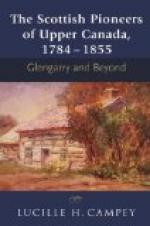CHAPTER IX
The Pioneers from Montreal: Alexander Henry the Elder
After 1763, when the two provinces of Canada were definitely ceded to Great Britain, the exploring energies of the Hudson’s Bay Fur-trading Company revived. But before this rather sluggish organization could take full advantage of the cessation of French opposition, independent British pioneers were on their way to explore the vast north-west and west, soon carrying their marvellous journeys beyond the utmost limits reached by La Verendrye and his sons. Eventually these pioneers, who had Montreal for their base and who wisely associated themselves in business and exploration with French Canadians, founded in 1784 a great trading association known as the North-west Trading Company. A few years later certain Scottish pioneers brought a rival exploration and trading corporation into existence and called it the “X.Y. Company”. In 1804 these rival Montreal fur-trading associations were fused into a new North-west Trading Company. Between this and the old Hudson’s Bay Company an intensely bitter rivalry and enmity—almost at times a state of war—arose, and continued until 1821, when the North-west Company and that of Hudson’s Bay amalgamated. It is necessary that these dry details should be understood in order that the reader may comprehend the motives and reasons which prompted the journeys which are about to be described.
Jonathan Carver, of Boston, U.S.A., was perhaps the pioneer of all the British traders into the far west of Canada, beyond Lake Superior, after Canada had been handed over to the British.[1] In 1766-7 he reached the Mississippi at its junction with the St. Peter or Minnesota River, and journeyed up it to the land of the Dakota. Thomas Currie, of Montreal, in 1770 travelled as far as Cedar Lake,[2] where there had been established the French post of Fort Bourbon. He was succeeded the next year by James Finlay, who extended his explorations to the Saskatchewan, whither he was followed by Alexander Henry the Elder in 1775.
[Footnote 1: Carver was not so remarkable for his actual journeys as for his confident predictions of a feasible transcontinental route being found to the Pacific coast.]
[Footnote 2: The white-barked conifer, which gives its name to this lake, is Thuja occidentalis. There are no real “cedars” in America.]
Alexander Henry (styled The Elder to distinguish him from his famous nephew of the same name) was a native of New Jersey (U.S.A.), where he was born in 1739. His parents were well-to-do people of the middle class who are believed to have emigrated at the beginning of the eighteenth century from the West of England, and to have been related to Matthew Henry, the Bible commentator. Their son, Alexander, received a good education, and after some commercial apprenticeship at Albany (New York) came to Quebec when Canada was




